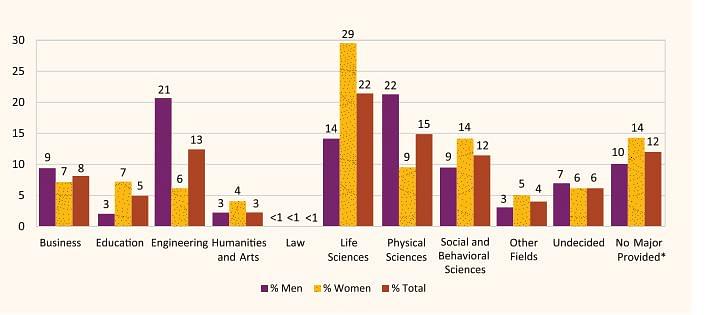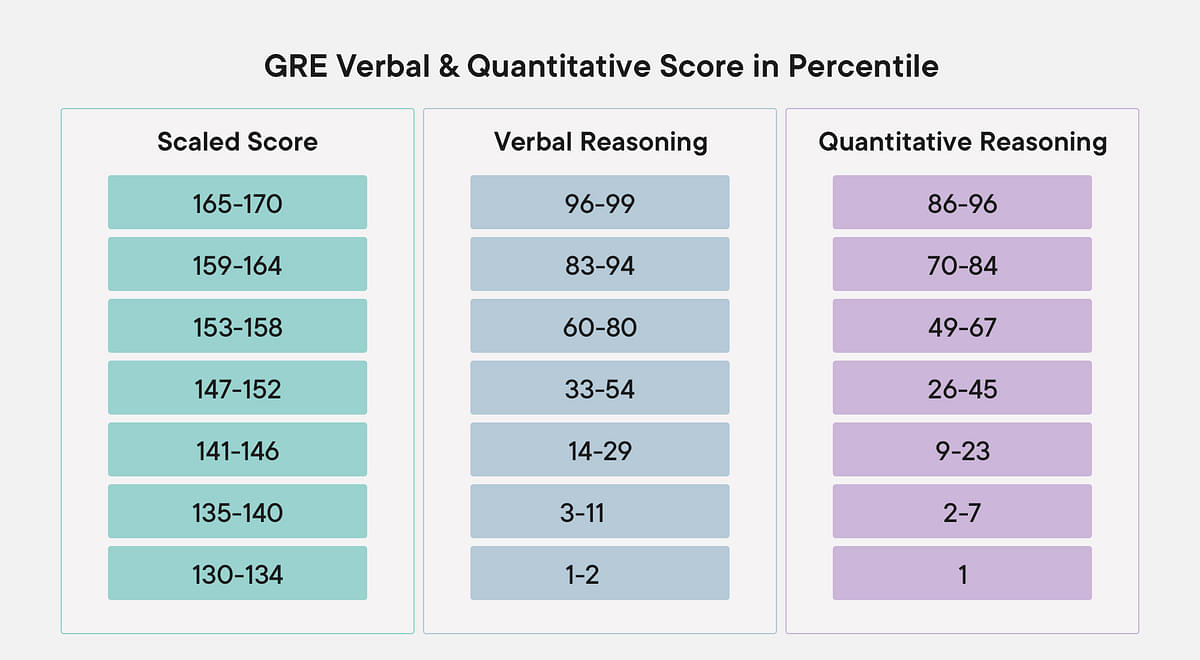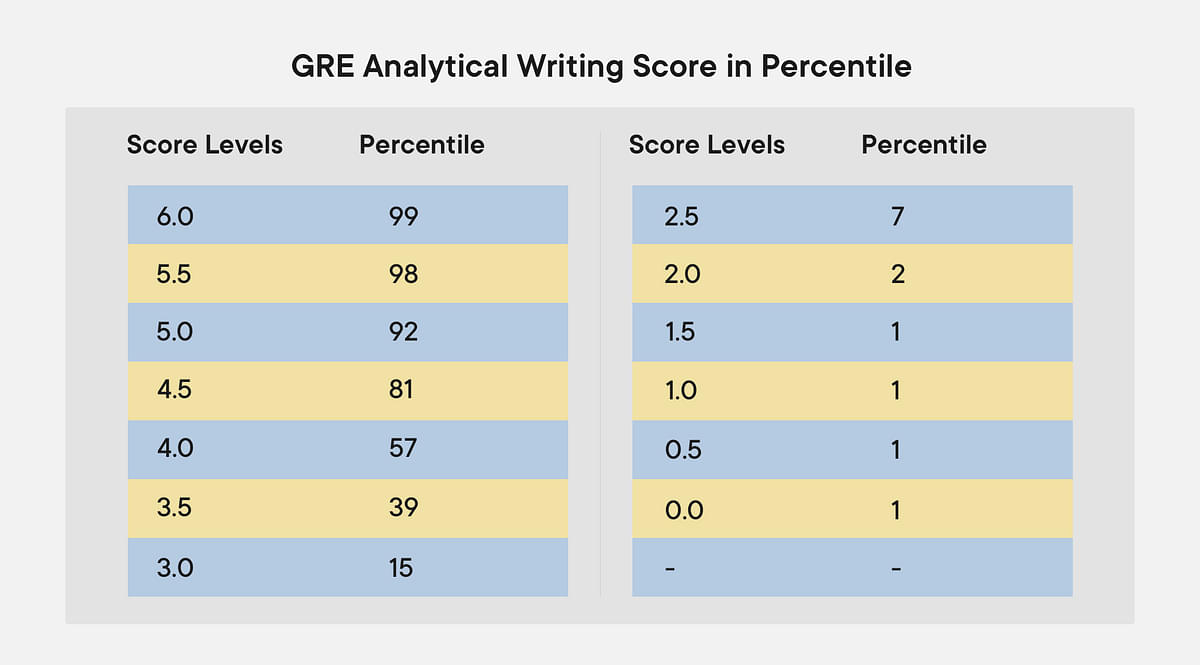GRE Exam: Exam Dates, Registration, Syllabus, Score and Sample Papers; www.ets.org

GRE is the placement test for seeking after postgraduate certificates in USA, Canada, and a couple of different nations. Because of fortuitous risks brought about by Coronavirus, up-and-comers can make GRE enrollment at home, an option in contrast to testing focus conveyed test. GRE test design involves three segments – Verbal Thinking, Quantitative Thinking, and Logical Composition. The verbal and quant segments are determined on a size of 130 to 170 each. The complete GRE score range is 260-340. GRE AWA is determined in a scope of 0.0-6.0. Top colleges require a GRE score of 150 to 160 for both verbal and quant. GRE test charge in India are INR 15,912 ($213) and GRE subject test expenses are INR 11,205 ($150). Top business colleges of the world acknowledge GRE scores for MBA programs now separated from GMAT scores. Up-and-comers get GRE test dates for general tests by and large around the year and for the subject tests, GRE test dates are fixed in September, October, and April.
Read About GMAT vs GRE
Note: Most universities made GRE score submission optional. It is advised for candidates to check the requirements before applying. GRE Scholarships are also available in university as per the score secured.
GRE Highlights
Contents [hide]
- 1 GRE Highlights
- 2 GRE Registration
- 3 GRE Exam Fee
- 4 GRE Eligibility
- 5 GRE Exam Pattern
- 5.1 GRE Analytical Writing
- 5.2 GRE Verbal Reasoning
- 5.3 GRE Quantitative Reasoning
- 6 GRE Score
- 6.1 GRE Score Report
- 6.2 How to Send GRE Score?
- 7 GRE Cutoff
GRE seems more difficult than ACT or SAT as the questions are designed for candidates who have completed their undergraduate. GRE verbal reasoning tests vocabulary through challenging reading passages, text completion, and sentence equivalence questions. GRE quant is comparatively easier than other competitive exams. The purpose of taking the GRE is to check the candidate’s level of academic excellence in undergraduate subjects. Few points to remember before taking GRE:
- Whether your selected course requires a GRE exam or other exams like ACT as a requirement
- Is there any kind of fellowships for merit-based applicants or GRE Scholarships for funding the course program?
- Have you shortlisted the course or doctoral research to pursue?
- Is your grad school GPA score eligible for applying for further studies?
If you assume a good GRE score is a myth then you have to make a detailed analysis and comparison of the grad schools you are dreaming to apply. Quant and Verbal sections of the exam are scaled on a range between 130-170. The average GRE score for Verbal Reasoning happens to be 151 and that of GRE Quantitative Reasoning is 154. Candidates can take the exam maximum of 5 times a year. The score validity for GRE is 5 years.
GRE Registration
To register for GRE, candidates need to create an MY GRE Account on the official website. GRE exam registration can be done in three ways, that includes:
- Online Registration
- Registration over Phone
- Registration over Mail
The steps for GRE Registration are given below:
- Create a My GRE Account on the official GRE website-ets.org/gre.
- To create a profile, candidates must fill in their data correctly. They need to fill in the following credentials Name, Date of Birth, Address, Phone Number, Communication Preferences, etc. Candidates can then log in to the ETS portal with their newly created Username and Password.
- Then candidates need to choose the test type: (i) GRE General Test, or (ii) GRE Subject Test.
- GRE exam centers and GRE test dates can be chosen from the available list of GRE dates
- Lastly, GRE exam fees of US $205 will be paid via credit or debit card.
Note: Candidates can make GRE Registration via phone by calling 1-800-473-2255. All necessary information will be given over a call.
GRE Exam Fee
The GRE registration fee is about $213. The GRE Exam fee in India rupees is about INR. 15,912. Here is the GRE Exam fee for different GRE services given below:
| GRE SERVICES | GRE FEES |
|---|---|
| GRE Exam Fees | US$ 213 |
| GRE Rescheduling Fee | US$ 50 |
| Request to change test centre | US$ 50 |
| GRE Cancellation Fee (at least 4 days before the test date & 10 days for individuals in Mainland China) | 50% of the Registration Fee is refunded |
| Additional GRE Score Report | US$ 27 each |
| GRE Score Reinstatement Fee | US$ 50 |
Note: GRE fee waiver of 50% is offered by ETS. The reduction in the total registration fee for candidates facing financial hardship. The form for this fee waiver is available on the ETS website and it is known as the GRE Fee Reduction Programme.
GRE Eligibility
There are no specific GRE exam eligibility criteria regarding age or educational qualifications. The only two things that candidates need to be concerned about is – Having a Passport if you are an Indian and successfully completed the undergraduate degree. The GRE admission criteria also depend on the university the candidate is applying to.
GRE Exam Pattern
The Exam patterns for both computer-based and paper-based are different. GRE Exam Pattern for the computer-based exam is adaptive in nature. GRE General Test format has 3 different sections namely, GRE analytical writing assessment, GRE verbal reasoning, and GRE quantitative reasoning. All these sections have 2 subsections. The total time span for GRE General Test is 3 hours 45 minutes. The three main sections of the GRE general test are as follows
GRE Analytical Writing
GRE Analytical Writing is always the first section of the test which comprises two types of questions. Analyze an Issue and Analyze an Argument are two types of tasks asked in this section. Candidates get 60 minutes to attempt two sections for 30 minutes each of GRE Analytical Writing in which they are required to analyze the logical soundness of the argument. You can go through GRE AWA Practice Papers for further practice.
GRE Verbal Reasoning
GRE verbal reasoning evaluates the candidate’s ability to analyze written material and incorporate data acquired from it. Candidates find GRE verbal reasoning section difficult for its tricky question types. Reading Comprehension, Text Completion, and Sentence Equivalence are three types of questions asked in this section. Verb Tense, Idioms & Idiomatic Expressions, Pronoun Agreement, Subject-Verb Agreement, etc, are some of the topics that are included under the GRE verbal syllabus. Candidates have to attempt 40 questions in 60 minutes. Go through the GRE Verbal Practice Papers for further practice.
GRE Quantitative Reasoning
With little practice, GRE quantitative reasoning can actually change the scorecard of the candidates. Quantitative comparison, Problem-solving, and Data interpretation comprise GRE quant syllabus. GRE quantitative reasoning contains questions that are modeled in real-life settings or completely in mathematical settings. These data interpretation questions are exhibited in tables, graphs, or other data displays. Candidates have to attempt 40 questions in 70 minutes. Go through the GRE Quant Practice Papers for further practice.
The GRE verbal section is comparatively easier than what the Power Prep series comprises, and candidates can actually score higher than what they generally obtain during the PowerPrep practice tests. Whereas, the GRE quant section’s first part is harder than what PowerPrep’s first part offers. Also, the last part of PowerPrep’s quant section is harder than what the actual test offers. From actual test-takers, it has been concluded that the GRE quant section, though it might appear easy but is actually tricky. In fact, the experimental quant section is even harder.
GRE has a paper-based test format and the table below holds the details of the GRE paper-based exam:
| SECTIONS | NUMBER OF QUESTIONS | ALLOTTED TIME |
|---|---|---|
| Analytical Writing (One section with two separately timed tasks) | One “Analyze an Issue” task and one “Analyze an Argument” task | 30 minutes per task |
| Verbal Reasoning (Two sections) | 20 questions per section | 30 minutes per section |
| Quantitative Reasoning (Two sections) | 20 questions per section | 35 minutes per section |
| Unidentified Unscored Section | Varies | Varies |
| Identified Research Section | Varies | Varies |
Apart from GRE general test, GRE has another test – the GRE subject test. This test is designed to check the knowledge of the candidates on their preferred subject. 6 subjects are included in the GRE subject test – Physics, Chemistry, Mathematics, English Literature, Psychology, and Biology. Aspirants take GRE subject test to make their applications outstanding by showing deep knowledge about a specific subject. ETS provides GRE practice books for each subject as study material. GRE Subject tests are available only in the paper-based format of GRE and these tests are available thrice a year – in September, October, and April. Scores are measured on a scale of 200-990 with 10-point increments. The total time for the test is 2 hours and 50 minutes and there are no individually timed sections. Most candidates who aim to pursue higher studies at the postgraduate level take the GRE Subject Test.

Percentage of Candidates Pursuing GRE at Post Graduate Level
In this above-mentioned picture, it is observed mostly people from life sciences backgrounds appear for this subject test is comparatively higher. Students prefer to study science subjects from abroad due to huge scholarships available for specific subjects.
GRE Score
GRE Quantitative Reasoning and Verbal Reasoning are scored on the GRE score range of 130-170 with 1 point increment. The average GRE score for Analytical Reasoning is measured on a scale of 0-6 with a half-point increment. If any question remains unattempted, no Score (NS) will be stated. As per the data collected from ETS between July 1, 2016, and June 30, 2019, the mean score for GRE General Test are as follows:
| SECTIONS | NUMBER OF TEST TAKERS | MEAN |
|---|---|---|
| Verbal Reasoning | 1640350 | 150.37 |
| Quantitative Reasoning | 1643587 | 153.39 |
| Analytical Writing | 1635221 | 3.58 |
In GRE Subject Test, all these 6 subject tests are scored on a scale of 200-290 with 10-point increments. Biology and Psychology have a subscore range of 20-99 score scale with 1 point increment. As per the data collected from ETS between July 1, 2016, and June 30, 2019, GRE mean score for Subject Test are as follows
| SUBJECTS | NUMBER OF TEST TAKERS | MEAN |
|---|---|---|
| Biology | 3644 | 665 |
| Chemistry | 8897 | 689 |
| Literature in English | 3370 | 542 |
| Mathematics | 15664 | 664 |
| Physics | 21065 | 714 |
| Psychology | 12556 | 619 |
GRE Scaled Score Percentiles for General Test
The below-mentioned table below explains the score v/s percentile scale for GRE Verbal Reasoning and Quantitative Reasoning as follows

Similarly for GRE Analytical Writing, the score percentile is measured in the following table

GRE Score Report
Your GRE Score Report contains the following information:
- Contact details like phone, name, email id
- Date of birth
- Gender
- Preferred graduate major
- GRE exam dates
- GRE test score and the percentile score
- Authorized score recipients
How to Send GRE Score?
After receiving the score, applicants will get the Scoreselect option to send test scores GRE to the graduate schools where they want to pursue any course. This Scoreselect option is available in both General and Subject Tests. After getting a good score on GRE, it is completely dependent on the candidate whether to send it to the university or not. After the test day, you need to pay a fee to send your scores and you can choose from the following options:
- Most Recent: Send your scores from your most recent test.
- All: Send your scores from all test administrations in the last five years.
- Any: Send your scores from one or as many test administrations as you like from the last five years.
GRE Cutoff
GRE cutoff ranges from 150 to 165 in top universities like Harvard, Stanford, MIT, and the University of California – Berkeley. The GRE cutoff depends on the college and program course that candidates’ are choosing. It is very important to understand the GRE cutoff and scoring method before you start preparing for the exam. GRE consists of three sections:
- GRE verbal (130-170 score scale)
- GRE quantitative reasoning (130-170 score scale)
- GRE Analytical Writing (0-5 score scale)
To get admitted to the top universities in the US to study MS or Ph.D. an overall goal score of 320+ and 4.5 in GRE AWA is required. GRE cutoff of some of the top universities are:
| TOP UNIVERSITIES | VERBAL (AVERAGE SCORE) | QUANT (AVERAGE SCORE) |
|---|---|---|
| MIT | 158 | 162 |
| Stanford University | 159 | 165 |
| UC Berkeley | 154 | 160 |
| Imperial College, London | 162 | 167 |
| Oxford University | 160+ | 160+ |
| London School of Economics | 163 | 163 |
| Illinois Urbana Champaign | 154 | 162 |
| Carnegie Mellon University | 160 | 162 |
| Georgia Tech | 155 | 161 |
| UCLA | 155 | 167 |
| University of Virginia | 163 | 166 |
| University of Texas Austin | 155 | 160 |
| University of Michigan Ann Arbor | 154 | 161 |
| University of Toronto | 150 | 150 |
| Duke University | 155 | 165 |
| Arizona State University | 154 | 162 |
| University of California – San Diego | 162 | 160 |
| University of Wisconsin – Madison | 163 | 163 |
| Northwestern University | 154 | 161 |
| University of Washington | 156 | 159 |
| University of Connecticut | 153 | 157 |
| Ohio State University | – | 157 |
| University of Maryland College | 154 | 160 |
| University of California Irvine | 151 | 161 |
| John Hopkins University | 163 | 164 |
| Vanderbilt University | 157 | 166 |
| University of Cincinnati | 155 | 159 |
| University of Melbourne | 304 | |
Candidates pursue different kinds of classroom or in-person courses for GRE preparation. Usually, the candidates take around 2-4 months before the scheduled date. To perform the best, candidates must target the score first. Few GRE preparation tips to help you during your GRE preparations:
- Always keep calm and come back to questions you couldn’t solve in the end;
- Self-preparation is one of the most fruitful techniques for GRE practice. Get a survey of the best kind of GRE Prep Books, and practice papers for GRE. Self-preparation will enhance self-motivation all the time.
- Get your hands on authentic study materials and practice papers.
- Taking crash courses online will help in getting updated study materials. This helps to acknowledge your strengths and weaknesses.
- Hire a personal tutor to get regular feedback on the status of your preparation.
- Know details about the syllabus and exam pattern of the GRE.
- Candidates can mix and match their preparation materials like books, CDs, videos, sample questions, and webinars.
- Taking regular mock tests will help in effective preparation. It will evaluate the readiness of your preparation.
- Making a proper study plan will help in monitoring the growth status of the candidates in terms of readiness.
- Understand the contextual meaning of the GRE words
- Reading different types of analytical non-fiction works will help candidates
- While solving sentence equivalence and text completion questions, go through the passage thoroughly before answering the questions
- Enroll yourself in top GRE coachings like Manya, Jamboree, IMS, and more.



